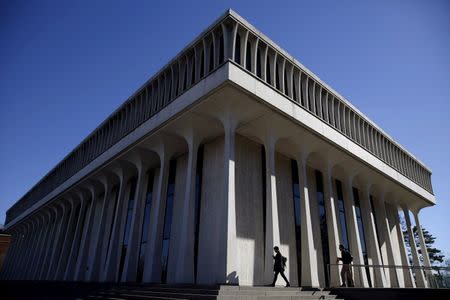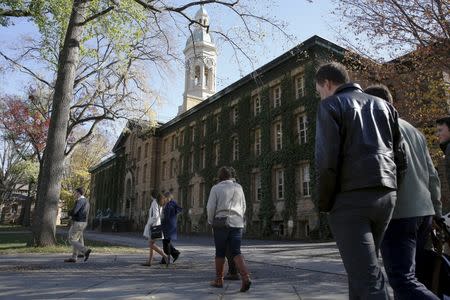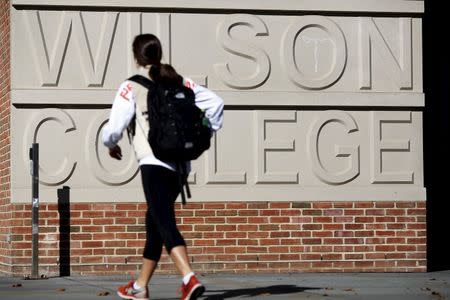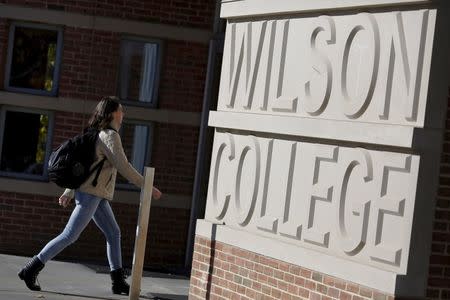Princeton may scrub U.S. President Wilson's name over racist ties
(Reuters) - Princeton University has pledged to consider renaming buildings dedicated to former U.S. President Woodrow Wilson in the latest U.S. campus effort to quell student complaints of racism by tweaking names, titles and mascots.
A deal top administrators signed late Thursday with student demonstrators ended a 32-hour sit-in outside Princeton President Christopher Eisgruber's office.
At about the same time, a threat against the university triggered a campus-wide safety alert but on Friday was "deemed not credible," school security officials said.
Protest organizers at the Ivy League university in New Jersey urged Princeton to remove Wilson's name and image from its public spaces and from its Woodrow Wilson School of Public and International Affairs.
Wilson, the 28th U.S. president from 1913 to 1921, was a leader of the Progressive Movement but also supported racial segregation, which was part of public policy at the time, particularly in southern states.
Segregation was banned under the 1964 Civil Rights Act.
Student organizers from the Black Justice League also want Princeton to institute a cultural competency and diversity training program and designate space for "cultural affinity" groups.
Calls for the removal of Wilson's name from buildings and programs at Princeton, where he was president from 1902 to 1910, arose during a wave of demonstrations at colleges over the treatment of minority students. Some aimed to show solidarity with students protesting the failure of administrators at the University of Missouri and Yale University to respond seriously to complaints of racial incidents on campus.
Some Princeton alumni were outraged at what one, Eric Chase, class of 1968, called an effort to "erase history and whitewash it and put something else in its place." The New Jersey attorney said two of his children and his brother and father are all Princeton graduates and his father taught at Princeton's Woodrow Wilson School of Public and International Affairs.
"Woodrow Wilson obviously ... had a very ill-informed and ignorant view of race," Chase, 69, said. "But he is a big piece of Princeton history and he should stay a big piece."
Twitter user @Jockular, who identified himself as a Princeton graduate, on Friday posted "@Princeton I'll never give another cent to PU. DISGUSTING, pandering PR from the Prez. go ahead, turn PU into LalaLand. - jfg, '68."
More than 250 comments on the agreement were posted on Princeton's official Facebook page and many expressed disappointment. An online petition named "Protect Plurality, Historical Perspective, and Academic Speech at Princeton" on change.org had nearly 500 supporters.
But Assani York, 20, a student at the Woodrow Wilson School who helped organize the protest, said meeting the demonstrators' demands - which include requiring faculty to be trained on cultural competency and instituting a diversity course requirement for students - would be a step forward.
"It would mean that Princeton is finally acknowledging the racism that this campus was built off of," York said. “There are people who do not feel comfortable walking into a dining hall and seeing the Woodrow Wilson mural, knowing it was someone who didn’t want them on this campus."
Changing attitudes to race and gender have become a flashpoint on campuses and in cities nationwide. Historical figures honored with statues, statehouse portraits, streets and buildings are being viewed through a more critical lens.
Schools in recent years have changed mascots and athletic team nicknames showing insensitivity to Native American tribes.
The University of North Dakota this week changed its nickname to "Fighting Hawks" after the National Collegiate Athletic Association deemed "Fighting Sioux" "hostile and abusive."
At Amherst College in Massachusetts, students and faculty are pushing for the small, elite liberal arts school to drop as its unofficial mascot Lord Jeff Amherst, who commanded British forces in North America during the French and Indian War and who is believed to have given blankets containing the smallpox virus to Native Americans. Trustees will discuss the issue in January, college spokeswoman Caroline Hanna said on Friday.
The newest dialogue about injustice on campus focuses on racism targeting African Americans.
Georgetown University in Washington, D.C., last weekend said it would rename two buildings named for school presidents who oversaw the sale of slaves to settle campus debt in the 1800s.
Yale University vowed this week to become more inclusive, in part by expanding financial aid to low-income students and creating a center for the study of race.
Princeton said this week it would change the title of those who oversee its residential colleges to "head" from "master."
(Reporting by Victoria Cavaliere in Los Angeles and Katie Reilly, Angela Moon and Barbara Goldberg in New York; Editing by Mark Heinrich and James Dalgleish)




